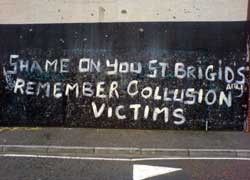7 September 2006 Edition
OPINION:The GAA needs to be consistent in relation to political involvement

Belfast graffitti - the decision by St Brigids was the focus of protests by Nationalist victims of the RUC\PSNI
GAA should not be used as Trojan horse for PSNI
The recent football match between St Brigids GAA club from South Belfast and a team representing the PSNI has been the focus of much media attention and protests by nationalist victims of the RUC/PSNI. Here, MATT TREACY examines the issues at stake for the GAA, the wider community and the future of the policing debate.
Last Friday the St. Brigid's club from South Belfast played a PSNI gaelic football team. This was only the latest episode in a campaign by the PSNI side to be accepted within the GAA and follows on from the abandoning of Rule 21, excluding "Members of the British armed forces and police", at the 2001 Congress.
This fixture, following as it did their taking part in the colleges Sigerson Cup in 2005, and a match against TDs and Senators in 2003, attracted much attention because of the participation in the match by 1993 Derry All Ireland winner and RTE pundit Joe Brolly who is a member of the St. Brigids club.
In fairness to Brolly he was quite candid about his reasons for taking part. He claimed that it was a manifestation of the need to move towards creating a civilised society and that the reasons for excluding the police force are no longer valid. This of course ties in intimately with the debate over acceptance by nationalists and republicans of the PSNI as currently constituted.
There are two things at issue. The first of these is the extent to which the PSNI has become an acceptable force to the nationalist community. The second is whether the traditional republican, and indeed GAA reasons, why members of the British forces have not hitherto been acceptable, still apply.
Republicans would argue that the PSNI has not yet in fact proven itself to be a police service that can have the confidence of a community which for its entire history it acted towards as an oppressor rather than the guarantor of 'law and order' as conventionally understood in a democratic society. And further that the changes necessary to guarantee that the PSNI will become such a force have not only not been implemented but have been frustrated not least of all by the PSNI itself.
Republicans would further argue that the reasons for instituting the rule in the first instance still stand given the nature of Britain's role in the Six Counties and of the police force as a fundamental part of that role.
Quite simply the British army and police forces, the Royal Irish Constabulary and Dublin Metropolitan Police, were regarded at the time of the GAA's founding as enemies of Irish nationality and enemies of those wishing to promote the aspiration for Irish freedom and to promote Irish culture. That this perception was not based on paranoia is proven by the voluminous files on the GAA maintained by Dublin Castle. Now, ironically, one of the best sources for the early history of the association.
Rule 21 was maintained following partition. Not only was it justified by the attitude of the state forces towards nationalists, but was confirmed time and time again by the actions of those forces against the GAA itself. In more recent times we have had the murder of GAA members by members of the British forces and loyalists.
People like Joe Brolly will argue that this is all in the past and that we must all move on. They will point, for example, to the fact that long standing issues such as the occupation of part of the GAA grounds at Crossmaglen are in the process of being resolved.
That is all very well but the fact remains that the policing situation has not been resolved and that resolution is likely to form a central part of future political negotiations. The danger is therefore that PR exercises such as last week's match will be used to exert pressure on the political process through ostensibly non-political channels.
The stark fact of the matter is that there are those who are attempting to use the GAA in order to further their agenda on policing. If the main issues are sorted out, and policing in the North subjected to the real reforms, including the abolition of Special Branch, that will ensure that it is no longer the colonial police force it has been since the founding of the Northern state, then obviously wider societal acceptance will reflect that.
However, the GAA ought not be put into the position of running social experiments, particularly on such sensitive issues. And most certainly it ought not be used as a Trojan horse to promote the notion that the PSNI is acceptable short of the radical changes that are required. Given the GAA's own apparent sensitivity to becoming embroiled in political issues, it ought therefore be consistent and ensure that no constituent part of the association is used to rehabilitate an unreformed and still unacceptable police force.


